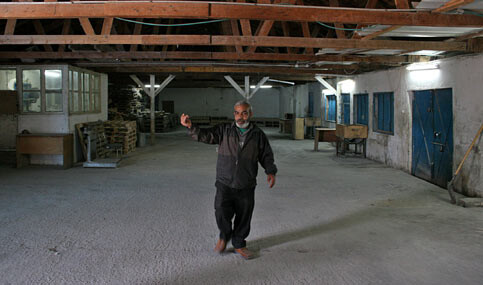World Food Programme 20 March 2006

A Palestinian worker stands inside an empty UN storehouse in Gasa City March 19, 2006. The Gaza Strip is dangerously short of basic foodstuffs and is facing a looming humanitarian crisis as a result of the continued closure of the main trade crossing with Israel, the United Nations warned Sunday. (MaanImages/Wesam Saleh)
JERUSALEM –- The United Nations World Food Programme (WFP) said today that food was running out in the Gaza Strip and appealed to the Israeli authorities to allow food consignments to reach the tens of thousands of people in Gaza who depend on food aid to survive.
At the same time, WFP called on the Palestinian Authority to take all necessary steps to ensure the security of WFP staff and other humanitarian aid workers inside the occupied Palestinian territory (oPt), to enable them to carry out their work unimpeded.
WFP said the extended closures of the Karni commercial crossing between Israel and Gaza have had a devastating effect on food availability in the Palestinian enclave. Stocks of wheat flour are already critically low and there are fears that there will soon be no basic commodities in Gaza.
“Our food supplies have almost run out and the bakeries are also empty. People are now having to rely on their own stocks, which will last only a few days at best,” said William Hart, WFP Deputy Country Director in the oPt. “The situation is critical, especially for the poorest and most vulnerable, who are dependent on our food aid.”
WFP provides food aid to some 430,000 people in the oPt, 160,000 of them in the Gaza Strip. Even before Hamas won parliamentary elections in January, WFP’s operations were 65 percent under-funded. Since then, the Israeli blockade, combined with deteriorating security in the oPt, have reduced food supplies to a trickle.
“We call on all sides to allow humanitarian operations to continue unimpeded,” Hart said. “This means lifting the blockade on aid convoys and commercial food deliveries, as well as ensuring safe conditions in the West Bank and Gaza for our international and national staff to work normally.”
As a result of the blockade, flour mills have been unable to provide 8,000 metric tons of wheat contracted earlier by WFP. Wheat flour makes up 80 percent of the basic diet in Gaza. Other commodities, including sugar, baby formula and dairy products, are also in short supply, leading to food prices soaring by more than 30 percent since January.
WFP has so far received only 37 percent of the US$81 million required for its two-year operation to provide food aid for non-refugee Palestinians up to 31 August 2007. Donors to date include: the European Commission (US$13.9 million), the United States (US$7.9 million), Japan (US$1.4 million), France (US$1.2 million), Norway (US$450,000), Austria (US$300,000), Switzerland (US$250,000) and Italy (US$70,000). A further US$800,000 has been received in multilateral donations, as well as US$13,000 from the private sector.
WFP is the world’s largest humanitarian agency: each year, we give food to an average of 90 million poor people to meet their nutritional needs, including 61 million hungry children, in at least 80 of the world’s poorest countries.
Related Links